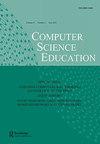在青少年科学和工程必修课中嵌入计算思维时保持多元化
IF 2.2
Q1 EDUCATION & EDUCATIONAL RESEARCH
引用次数: 1
摘要
计算思维和实践(CT |p)是理工科学生的关键能力。对于以青少年为参与者的研究,表现出来的研究哲学有时与社会多元主义不一致。基于2016年至2019年初对10-15岁青少年(认知和情感发展的敏感年龄范围)在理工科必修课中CT b| P的研究文献,我们撰写了一篇文献综述,主张使用更多元化和批判性的研究哲学,这将加强研究设计、实施和元推理(Collins et al., 2012)。我们根据混合研究常见的研究哲学分析了20个合格的研究,对那些承认文化多元化、让这些多元化相互交流、并确保历史上被边缘化的人群公平参与(Onwuegbuzie & Frels, 2013)的研究给予了额外的关注。我们发现,研究始终强调中间实用主义和实践社区;有时在批判现实主义、右翼实用主义或变革解放哲学中运作;很少用辩证的方式。为了避免脱离背景或过度个人主义的方法无法解决系统性和体制性的社会不平等(在教育、住房、医疗保健、警务、投票等方面),未来的工作应该采取更多元化和批判性的哲学方法。我们强调了几个例子,希望研究能够支持年轻人以文化可持续的方式维持和扩展计算实践(Paris, 2012)。本文章由计算机程序翻译,如有差异,请以英文原文为准。
Maintaining pluralism when embedding computational thinking in required science and engineering classes with young adolescents
ABSTRACT Background and Context Computational thinking and practices (CT|P) are key competencies for learners in science and engineering. For studies with young adolescents as participants, manifested research philosophies are sometimes inconsistent with societal pluralisms. Objective Based on research literature from 2016 to early 2019 for CT|P in required science and engineering classes with youth ages 10-15 – a sensitive age range for cognitive and affective development – we wrote a literature review that argues for the use of more pluralistic and critical research philosophies, which will strengthen research design, implementation, and meta-inferences (Collins et al., 2012). Method We analyzed 20 qualifying studies per research philosophies common to mixed research, giving extra attention to studies that acknowledge cultural pluralisms, engage those pluralisms in conversation with each other, and ensure that historically marginalized populations have equiTable – not just equal – participation (Onwuegbuzie & Frels, 2013). Findings We found that studies consistently emphasized pragmatism-of-the-middle and communities of practice; sometimes operated within critical realist, pragmatism-of-the-right, or transformative-emancipatory philosophies; and rarely engaged in dialectical ways. Implications To avoid decontextualized or overly individualistic approaches that fail to address systemic and institutional social inequities (in education, housing, healthcare, policing, voting, etc.), future work should take more pluralistic and critical philosophical approaches. We highlight several exemplars in hope that research will support youth in maintaining and extending computational practices in culturally sustaining ways (Paris, 2012).
求助全文
通过发布文献求助,成功后即可免费获取论文全文。
去求助
来源期刊

Computer Science Education
EDUCATION & EDUCATIONAL RESEARCH-
CiteScore
6.90
自引率
3.70%
发文量
23
期刊介绍:
Computer Science Education publishes high-quality papers with a specific focus on teaching and learning within the computing discipline. The journal seeks novel contributions that are accessible and of interest to researchers and practitioners alike. We invite work with learners of all ages and across both classroom and out-of-classroom learning contexts.
 求助内容:
求助内容: 应助结果提醒方式:
应助结果提醒方式:


